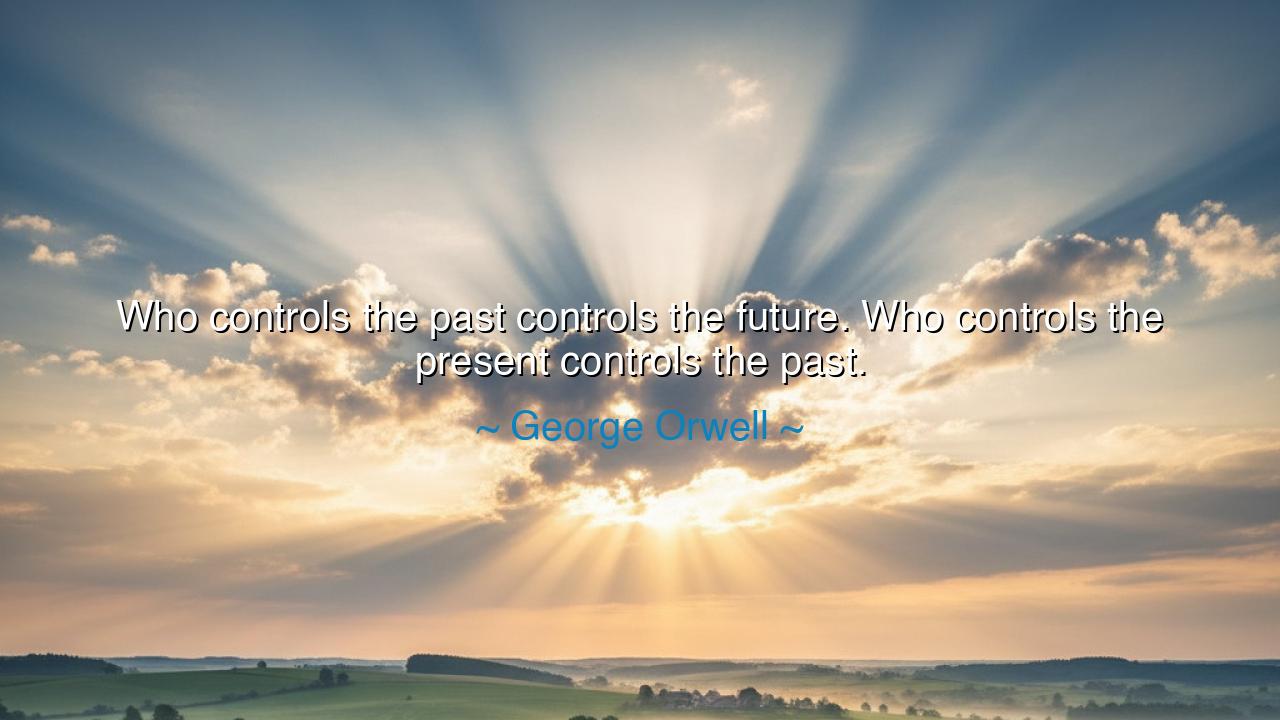
Who controls the past controls the future. Who controls the






Hear now, O seekers of truth, for the words of George Orwell echo a profound and terrifying truth about the nature of power, control, and history. He said—"Who controls the past controls the future. Who controls the present controls the past." In these words, Orwell unveils the mechanism by which those in power shape not only the current reality but the very narrative of history itself. It is a warning to those who believe that the past is fixed, immutable. It is not. The past, like the present, is subject to manipulation, and in this manipulation, the future is born. This is the way in which control is exerted, not only over the world we inhabit, but over the very way we understand our place in it.
What does it mean to "control the past"? The past, O children, is not simply a record of events that have already come to pass. It is the lens through which we see the present and the future. To control the past is to control how we remember it, how we interpret the events that have shaped us. History is often written by the victors, by those who have power—and in the hands of those who control history, the narrative of the past becomes a tool for justifying their actions, their rule, and their vision for the future. When those in power control the story of the past, they create a world where the present and the future are shaped by falsehoods, omissions, or distortions of the truth.
Consider the example of the Roman Empire, that vast civilization whose history was recorded not by the humble, but by those who ruled with absolute authority. The emperors and their appointed historians shaped the past to present an image of Rome as a city of glory, power, and eternal triumph. The glorious victories, the mighty legions, the grandeur of Roman civilization were often exaggerated or spun to reflect the greatness of the empire. The truth of the struggles, the oppression, and the injustices faced by many within the empire was erased from the narrative, for such stories did not serve the interests of the rulers. In this way, the future of the Roman Empire was shaped not by its true history, but by the story told by those in power.
In a more modern context, let us look to the sociopolitical forces that shape the way we understand wars, movements, and leaders. The rewriting of history in some cultures—where uncomfortable truths about past injustices are buried or manipulated—shows us that the past is never as fixed as it may seem. Those who control the present have the ability to shape how future generations will understand the events of the past. The distortion of history is not just about facts—it is about shaping the worldview of those who come after us, influencing how they will interpret the present and create the future.
The great philosopher Plato understood this concept well when he described the Allegory of the Cave. In this allegory, the prisoners are chained, unable to see anything but the shadows of objects on a wall, shadows cast by things they do not understand. These prisoners, Plato suggests, are like those who live under the sway of false narratives about the world. The shadows they see are not the truth of the world but are manipulated reflections that distort the reality around them. Those who control the shadows—those who control the narratives of the past—shape the perceptions of the present and, in doing so, ensure their dominance over the future. History, like the shadows, can be distorted to fit the needs of those in power, and it is only by seeking the truth that we can break free from the chains of manipulation.
The lesson, O children, is this: never trust blindly the stories told by those who wield power. Seek the truth, for the past is often a battlefield where the realities of oppression, injustice, and struggle are erased or rewritten to serve those who seek control. Understand that the future is shaped not only by what happens now, but by how we remember the past. If we allow those in power to shape the story of history, we allow them to control the future. The truth of the past is not always what is presented to us; we must look deeper, question the narratives, and search for the stories that have been silenced.
Thus, O seekers of wisdom, let us be ever watchful and vigilant in understanding the stories we are told, both of the past and the present. Let us seek to uncover the truths hidden in the shadows, to understand the real forces that have shaped our world, so that we may be empowered to shape the future with clarity and honor. Do not let the past be twisted into a tool for manipulation, but instead, let it be the foundation upon which you build a better world. The power of the present is in your hands; let it not be stolen away by those who seek to distort the truth for their own gain. In knowing the true past, we can forge a future free from the manipulations of the present.






AAdministratorAdministrator
Welcome, honored guests. Please leave a comment, we will respond soon